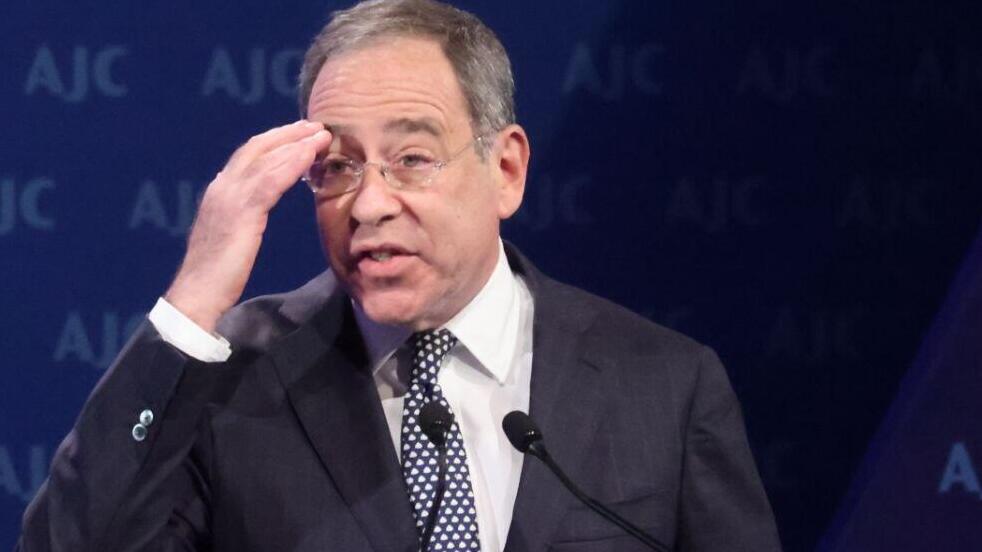Outgoing U.S. Ambassador to Israel Tom Nides said U.S. President Joe Biden cannot sit back and watch Israel go "off the rails." In an interview published on Monday in the Wall Street Journal, Nides said that he had urged Prime Minister Benjamin Netanyahu to halt his legislative push to overhaul the judicial system.
More stories:
The senior diplomat agreed that it was unusual for a U.S. administration to weigh in on what appear to be purely domestic matters but said the legislation pushed by the Netanyahu coalition raised questions about Israel’s democratic credentials, which are the basis of the special relationship between the two countries that was based on mutual values.
"I think most Israelis want the United States to be in their business," Nides said adding that with the special bond between the nations, "comes a modicum of a price, which is articulating when we think things are going off the rails,” he said. "One of the messages I sent to the prime minister was to tap the brakes, slow down and try to get consensus."The Ambassador was concerned that Netanyahu was “rushing things through that ultimately could have huge implications, at least perception-wise, about what makes Israel great.”
Biden told CNN on Sunday that Netanyahu's coalition is the most extreme, referring particularly but not exclusively to Finance Minister Bezalel Smotrich and National Security Minister Itamar Ben-Gvir. Smotrich responded on Monday to Biden's interview claiming Israel has a right to settle wherever it chooses. "it is his right to express criticism, it is our right and duty to continue working to fulfill the mission of Israeli citizens, to defend ourselves, and to build our homeland," Smotrich said.
Netanyahu himself told the Wall Street Journal last week that he was attentive to the public pulse in Israel and would pass legislation that would be one that would "stick for a generation.
He insisted Israel's ties with the United States remain strong, even though President Joe Biden has not yet invited him to the White House. “I think it may take some time, but I think, of course, I should expect to meet President Biden,” Netanyahu said.
3 View gallery


Prime Minister Benjamin Netanyahu in the Knesset ahead of the vote to limit Supreme Court power
(Photo: Alex Kolomoisky )
Opponents of Netanyahu's legislative push have been taking to the streets in the hundreds of thousands for the past 27 weeks and vow to continue their protests to stop what they see as an assault on Israel's very democratic character. Among them are many who volunteer to serve in the IDF reserve in vital positions including in the Airforce, intelligence units, Naval commando units, and special forces. They claim they cannot serve a non-democratic regime and once the law advanced by the coalition, which would weaken the Supreme Court's ability to oversee the decisions of the executive branch, is passed, they would not return to service when called.
3 View gallery


Mass protest of the government's legislative push to overhaul the judiciary in Tel Aviv for the 27th week on Saturday
(Photo: EPA)
Earlier on Monday, Chairman of the Bank of Israel Amir Yaron said the cost to Israel's economy from the government's push will continue to grow. Yaron had previously warned that the legislation advanced by Netanyahu's coalition has caused a considerable drop in foreign investments, a fall in the value of the shekel and a rise in inflation.
In his interview, Nides also repeated Biden's assertion that Israel and the Palestinians must strive for a two-state solution to their long-lasting conflict although both parties did not appear to have the appetite to reach such a resolution.
He praised Mansour Abbas, head of the Islamist Ra'am Party that partnered with the previous government coalition, calling him "my hero," for taking personal and political risks. “We need more Mansour Abbases and less other people, who shall remain nameless,” he said.
KNESSET VOTE: REASONABLENESS STANDARD BILL - GIL HOFFMAN





